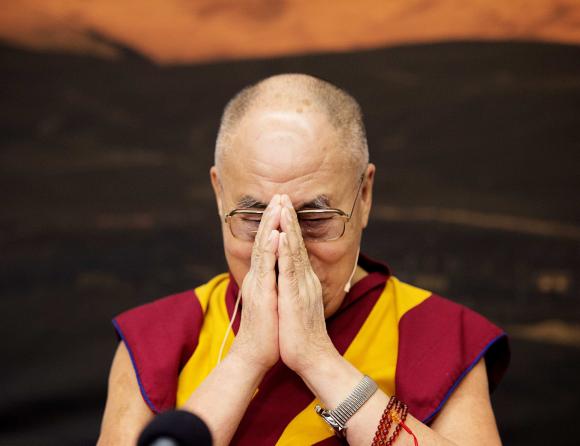The Dalai Lama will be visiting the small southern African nation of Botswana next month, where he is scheduled to deliver a public address at the sold out three-day Mind and Life Dialogue in Gaborone, and also rumored to be meeting with President Ian Khama. Beijing has expressed and reiterated protest over the meeting, as has come to be expected regarding the Dalai Lama’s planned meetings with foreign leaders. Reuters’ Ben Blanchard reports:
China stepped up its warning to Botswana on Wednesday over a planned visit by exiled Tibetan spiritual leader the Dalai Lama next month, demanding the African nation respect China’s core interests.
[…] China has already “clearly” expressed its point of view about the Dalai Lama’s visit, Foreign Ministry spokesman Lu Kang told a daily news briefing.
“Issues relating to Tibet concern China’s sovereignty and territory integrity. We demand the relevant country earnestly respect China’s core interests and make the correct political decision on this matter,” Lu said, using stronger language than before on the issue.
“China will not interfere in other countries’ internal affairs, but will certainly not tolerate another country doing anything that harms China’s core interests,” he added, without elaborating. [Source]
In his regular press conference on July 14, Chinese Foreign Ministry Spokesperson Geng Shuang announced Beijing’s initial protest of a possible meeting between the Dalai Lama and President Khama. Just prior to the Chinese Foreign Ministry’s reiteration of protest, Botswana’s Foreign Minister stressed the private nature of any meeting, and echoed China’s normal rhetoric on national sovereignty when questioned about the upcoming meeting yesterday. From the AFP:
Botswana Foreign Minister Pelonomi Venson-Moitoi told lawmakers that the visit was “purely private” but added that the Dalai Lama would be granted the status of a foreign dignitary.
[…] She did not confirm a government announcement last week that he would meet President Ian Khama, which prompted a stern response from Beijing.
However the president will “extend basic courtesies for Dalai Lama” and the government protocol office “is charged with the responsibility to facilitate foreign dignitaries… this includes Dalai Lama,” the foreign minister said.
Venson-Moitoi also said in a parliamentary answer that “the principle of non-interference in the international affairs of other countries is at the core of China’s foreign policy”.
“We therefore expect… China to respect our sovereign decision on this matter.” [Source]
Botswana is one of many African countries to receive substantial infrastructure investments from China as Beijing has increased economic and diplomatic engagement with Africa in recent years. Despite some tensions on the ground relations between the two countries are officially considered to be “excellent and mutually beneficial,” though some recent reports from Botswana claim a deterioration of relations under President Khama. Aside from ejecting some Chinese contractors and rejecting the visas of others, the Khama government also angered Beijing last year by voicing support for the international tribunal that went on to rebuke Chinese claims in the South China Sea (a ruling which China rejected). The head of the Botswana National Front, the main opposition party to President Khama’s Botswana Democratic Party, has criticized the president as “recklessly amateur” and promised to be less antagonistic to Beijing if elected to power.
The Chinese government considers the Dalai Lama a separatist despite his decades of advocacy not for an independent Tibet, but for genuine autonomy within China. Regular protest from the Foreign Ministry over foreign leaders’ meetings with the 82-year-old exiled Tibetan spiritual leader has led to his substantially less diplomatic engagement with Western leaders in recent years.
In April, the Dalai Lama visited Tawang—a small Himalayan district administered by an Indian state that Beijing claims sovereignty over much of—his first visit since 2009 to the region that served as his resting spot after fleeing Tibet in 1959. The district has long been considered a potential birthplace for the Dalai Lama’s reincarnation, and the visit rekindled a debate between Beijing and the Dalai Lama over who has the right to name the aging spiritual leader’s successor after his death.







